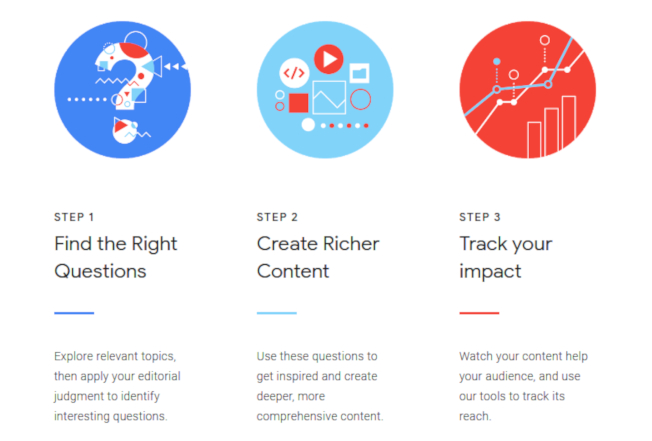Google isn’t shy about letting us know what it wants. But in the increasingly important world of instant answers and FAQs, third-party vendors have stolen a march on the search giant, with tools like Authoritas’ FAQ Explorer anticipating Google’s desires before Google itself had a chance to elucidate.
Now, for the first time, Google is providing direct instructions on how to address users’ unanswered questions. This the the Question Hub, which presents an exciting opportunity for brands, businesses, and SEOs to serve up the specific content Google needs.
What is Google Question Hub?
In Google’s own words, “Question Hub is a tool that enables creators to create richer content by leveraging unanswered questions”:
Question Hub collects these unanswered user questions and surfaces them to bloggers, writers, and content creators like you. With Question Hub, you can:
- Explore topics you’re interested in
- Use relevant user questions to create more comprehensive content for your audience
- Track the impact of your content created using Question Hub
The Question Hub has actually been in operation since 2018 across India, Indonesia, and Nigeria. Google chose to release the hub in these countries first in order to address a stark lack of relevant content to answer intent-based searches in users’ native languages.
How are the questions in the hub generated?
We did wonder exactly how these questions are being generated. Surely it cannot be a case of simply scraping unanswered questions directly from users, can it? Well, actually, it can. Google had this to say:
We collect unanswered user questions using a variety of different methods. These unanswered user questions are straight from users, so you may occasionally see misspellings or questions in which the user’s intent is unclear. We’ll continue to explore other ways to find and surface the best unanswered questions from users so we can then share them with creators.
With the roll out of BERT, Google may also be identifying questions they are no longer satisfied they have the correct answer for. Whether or not that proves to be the case, Question Hub should quickly become a priority for almost every content strategy. It might just create a crucial advantage over competitors who have so far failed to identify purchase-critical questions.
Why did Google introduce Question Hub?
By introducing the Google hub in the US at the start of January, Google is empowering its users to fill gaps they have themselves identified in the search engine. It seems like a positive for both parties, with website owners seeing an opportunity to drive qualified traffic by answering pertinent questions. Of course, Google will benefit too, as reputable sites engage with the Question Hub to fill gaps.

Credit: Google
How exactly does Google Question Hub work?
- Google Search Console (GSC) access is required.
- Select “Add Questions” to search or explore relevant topics.
- Click “Add” to have the user-generated question added to your list.
- Review your full list of questions identified to pick the most content-worthy.
- Create engaging content that answers the user’s question before submitting it.
- Performance can be tracked via the “Performance” tab in GSC.
Submitting your freshly minted content through the Question Hub will not instantly improve your SEO organic ranking in search. It will, however, allow you to track the performance through Search Console, and it may well expedite the indexing process compared to submitting a full page for indexing generally. This content is qualified as answering a specific question, and Google is crawling it with that in mind.
It is also worth noting that even though we are creating super exciting content for a user-generated question, it may never reach its intended target. Right now, Google has no way of notifying the user who initially asked the question. A bit selfish from Google? Never…
While we’re not suggesting your entire strategy should not be built around answering questions in this hub, it does give us even more insight into how users are searching. Take inspiration from the questions identified and create engaging content that answers them (but don’t take this as permission to neglect your existing FAQs!).
Want to get ahead of the game, cater to your customers’ specific needs, and maximize your brand’s search visibility? That just happens to be our primary area of expertise. Let’s talk!




